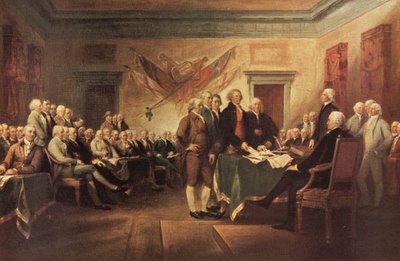
A Time to Speak the Truth in Love
Dr. Dale V. Salico
Address to the General Board, ABCUSA, November 17, 2005
For months the ABCPSW Board had struggled with the contrasting injunctions found in Scripture to:
· stand for the truth of God resisting error within the Church to the point of separation if necessary; and
· maintain and strengthen unity within the Church, which is the body of Christ.
·
Consider the following Scriptures:
Make every effort to keep the unity of the Spirit through the bond of peace. There is one body and one Spirit--just as you were called to one hope when you were called--one Lord, one faith, one baptism; one God and Father of all, who is over all and through all and in all. Ephesians 4:3-6
Anyone who breaks one of the least of these commandments and teaches others to do the same will be called least in the kingdom of heaven, but whoever practices and teaches these commands will be called great in the kingdom of heaven. Mathew 5:19
Despite first appearance, these are not competing imperatives. The Church is not to choose between unity and truth. The Church is to be unified in and by the truth. And the truth that is embraced by the Church includes its unity. It is through “speaking the truth in love” that the church “grows up into Him who is its head, even Christ.” (Ephesians 4:15)
For twenty years American Baptists have discussed, with greater and lesser levels of contentiousness, the issue of homosexuality. The General Board Resolution on Homosexuality, far from ending the conflict, merely changed the level of discussion because it lacked statements of implementation. Today, with a growing percentage of Americans questioning or openly rejecting the 2000 year-old understanding of the Christian Church that homosexual behavior is sinful, the need for the Church to speak clearly has become inescapable.
Yet American Baptists have been unable to speak with clarity. Despite good faith efforts by American Baptists of all persuasions to reach consensus, the best the ABC has been able to do is write a deliberately ambiguous one-sentence Resolution that set precedent in the denomination by its lack of implementation points. That Resolution states, The practice of homosexuality is incompatible with Christian teaching.
It is the conviction of the American Baptist Churches of the Pacific Southwest that this Resolution represents the clear and unambiguous teaching of the Bible, and that it should govern in a visible way our life together as a denomination of covenanting partners. For the past eight years I, as well as delegates from the ABCPSW have said stated this conviction in the General Board as well as other ABC arenas. While we have worked for unity in our body, we have also made it clear that our churches were increasingly dissatisfied with what they see as a contradiction between this American Baptist Resolution and the American Baptist reality.
What action did the ABCPSW Board of Directors take?
It is important to understand the sequence of events that pertained to Board decisions. On May 12, 2005 the Board of Directors of the ABCPSW approved the following resolution.
Be it resolved that if the issues regarding homosexuality are not biblically dealt with by the end of the Biennial Meetings of the ABCUSA July 1-4, 2005, we as a Region will move forward with [following] process. . .with the understanding that we are remaining a covenanting partner in the ABCUSA.
1. Remain a full covenanting partner, but reduce participation in ABCUSA-generated meetings. . .
2. Remain a full covenanting partner in the ABCUSA but establish parallel relationships with other bodies that will help us advance our vision and mission priorities. . .
3. Withdraw from the ABCUSA Budget Covenant, but continue as a Covenanting Partner in the ABCUSA.
Four times in this resolution the Board affirmed its desire to remain within the Covenant of Relationships. In specifying its intent to withdraw from the Budget Covenant, the Board was attempting to call attention to the fact that it was in very serious conflict with directions set by the ABCUSA and that much work was needed to prevent a possible separation.
In response, Dr. Medley expressed regret that the Board felt such measures were necessary. Then he stated that it was not possible with withdraw from the Budget Covenant and remain a member of the Covenant of Relationships. “To break the budget Covenant will be to break the whole Covenant of Relationships and be out of Covenant as a Region.”
Our Region Board was now faced with a situation in which all its previous attempts to communicate serious dissatisfaction with the treatment the ABCUSA was giving to its Resolution on homosexuality had been disregarded. All recommendations for implementation by this Region and other Regions in recent years, most recently at the very important General Executive Council meetings in April, 2005, had been rejected. The Regional Executive Ministers had gone to the April meeting in San Antonio, Texas committed to approve recommendations to the General Board to implement the Resolution on Homosexuality. At the end of those meetings, despite the clear communication from several Executive Ministers including myself that there would be very negative repercussions in our Regions if we reported to our Boards that the GEC would not recommend any implementation of this important policy to the General Board last June.
At the meeting in San Antonio I stated that I was not certain I could hold the ABCPSW in Covenant if I took home such a report, and recommended we appoint a task force of GEC members to study possible minimal implementation steps and report back to the GEC in six months. This recommendation was also rejected.
On September 8, 2005, following months of discussion and prayer, the following resolution was approved:
Because the deep differences of theological convictions and values between the American Baptist Churches of the Pacific Southwest (ABCPSW) and the American Baptist Churches in the USA (ABCUSA) are understood by the Board of Directors of the ABCPSW as irreconcilable, the Board of Directors of the ABCPSW takes the following action effective September 9, 2005:
1. Initiate the process to withdraw from the Covenant of Relationships of the ABCUSA. The Executive Committee of the ABCPSW will report to the ABCPSW Board of Directors regarding issues related to this action by December 8, 2005. Upon approval by the Board of Directors of the ABCPSW recommendations will be sent to the churches for a vote at a specially called meeting of the Region.
2. Authorize the Executive Committee of the ABCPSW to consult with necessary professionals regarding issues related to this action.
3. Withdraw from the Budget Covenant of the ABCUSA effective 12/31/05.
Recognizing that part three of the Resolution, withdrawing from the Budget Covenant, had led to confusion regarding the date of the Region’s withdrawal from the Covenant of Relationships, on October 13, 2005, the ABCPSW Board of Directors changed part three of the resolution to read, The ABCPSW will remain in the Budget Covenant until such time as the churches vote the Region out of the Covenant of Relationships.
The following is the sequence of actions projected over the next six months for the ABCPSW:
1) The Executive Committee of the ABCPSW is studying the implications of withdrawing from the Covenant of Relationships;
2) On December 8, the Executive Committee will report to the Board of Directors. The Board will have the following options for action:
i. Recommend further study.
ii. Approve the study and recommend that the churches endorse the proposed withdrawal from the Covenant of Relationships, calling for a special meeting of the ABCPSW, providing the churches with not less than 90 days notice of this meeting and its agenda.
iii. Approve the study and rescind its recommendation to withdraw from the Covenant of Relationships.
3) If the Board of Director approves of the study and recommends that the churches endorse the proposal to withdraw from the Covenant of Relationships, complete information will be sent to the churches regarding the meeting and the number of delegates assigned to each church according to the Bylaws of the ABCPSW. The Region’s Bylaws do not require a vote by the churches to approve the action by the Board. The Board of Directors feels that in such a weighty matter, an expression of the will of the delegates will provide the Board with the input it needs to make a responsible and informed decision.
The ABCPSW remains at the present time and will remain at least through the first quarter of 2006 a full covenanting partner with the ABCUSA. We therefore view the action of the General Board Executive Committee in September 2005 to ask ABCPSW delegate Manuel Luquin to leave the meeting of the GBEC when it discussed the actions of the ABCPSW as both inappropriate and unwise. It was inappropriate because the action had no basis in the ABCUSA Bylaws, Standing Rules, the Covenant of Relationships or in law. It was unwise because the only person in the room who could give insight regarding the reasoning and heart of the ABCPSW Board was asked to leave after sharing in five minutes the state of the Region.
It was likewise inappropriate and unwise for the GBEC to ask our delegates not to come to the November meeting in Green Lake. This request was withdrawn by President Johnson in her letter of October 2005. However, the President continued to request ABCPSW delegates to recuse themselves during discussion of our region’s action. This repeated insistence that ABCPSW delegates not participate in discussion left us with the impression that our covenant partners do not desire to hear what has caused the Region Board to take the action it did nor for us to hear discussion that concerns this Region directly.
What feelings accompanied the action of the Region Board?
Brian Scivens, President of the ABCPSW Board of Directors, in his letter to the churches stated:
The Board of Directors of the ABCPSW is deeply grieved over this decision. We continue to recognize our brothers and sisters in Christ in the ABCUSA as beloved friends and co-workers in the Body of Christ. Because of our long history and many common concerns in gospel ministry, we will have opportunities for continued fellowship and partnership. Our decision to withdraw from the Covenant of Relationship is made without animosity or malice. We will continue to pray for God’s blessing on the ABCUSA, its leadership, agencies and congregations.
If the ABCPSW withdraws from the Covenant of Relationships, in what ways would it desire to continue to partner together for mission?
In voting to begin a process to withdraw from the Covenant of Relationships the Board stated that it desired to create distance between the ABCPSW and the ABCUSA so that both may move ahead in the mission God has given them without continual conflict. The creation of distance does not mean the ending of all partnership. American Baptists partnered together in mission for over 60 years before the Covenant of Relationships. It stands to reason that we can partner together in mission where there is agreement to do so after a party withdraws from the Covenant of Relationships. Think of the desire of the ABCPSW as “three d’s”-- distance and distinctiveness with the least amount of damage possible.
I have presented to the General Board Executive Committee a list of twelve talking points concerning areas for possible future cooperation if the ABCPSW does pull out of the Covenant of Relationships. These are ways the ABCPSW can continue to partner with our brothers and sisters in Christ in the ABCUSA in areas of agreement, despite our serious disagreement.
It is not, as some have suggested, the intent of this Region to retain the benefits of being American Baptist while avoiding the responsibilities of being American Baptists. Our desire is to work together for the advancement of God’s kingdom where there is agreement and where it is to the benefit of the ABCPSW, the ABCUSA and our other mission partners to do so.
The issues we have raised are not directed equally toward all covenanting partners. We are in agreement in conviction and core values with many Regions as well as other American Baptist agencies. It is our intention to work together with these partners wherever possible. It is also our intention to avoid speaking disparagingly of any American Baptists. We will continue to value American Baptists, including those with whom we have serious differences as brothers and sisters in Christ’s kingdom.
What would it take on the part of the ABCUSA to cause the ABCPSW Board of Directors to reconsider its action?
We have discussed in our Executive Committee and Board what it would take on the part of the ABCUSA to cause the ABCPSW Board of Directors to reconsider its recommendation to withdraw from the Covenant of relationships. The following three points summarize the Board’s discernment at this time.
1. The ABCUSA must treat seriously its Resolution on Homosexuality dated 1992. The General Secretary should demonstrate that this resolution expresses the clear teaching of the Bible and encourage congregations to be welcoming and transforming agents for persons struggling with this sinful behavior. We urge the ABCUSA to reestablish accountability for accepting the authority of the Bible as the Word of God. The ABCPSW is deeply troubled about being part of a denomination whose commitment to theological inclusiveness has displaced its commitment to Biblical discipline.
2. At the Common Table (the General Board with its commissions and committees, the Office of the General Secretary, the program Boards related to the ABCUSA) policies should be implemented to ensure that membership of Boards, Committees and Commissions, as well as platform leadership are consistent with the ABCUSA Resolution on Homosexuality.
, 3. We urge the General Board to appoint a commission authorized to implement what is needed to achieve the above items. This is not a study commission or discussion commission. We have been grieved by 20 years of inaction. The most recent ABCUSA consultant has told us that in addition to dealing with issues of structure and communication, action needs to be taken to get the ABCUSA off the fence regarding the issue of homosexuality which is immobilizing us in pursuit of God’s mission. We have heard and we agree with the consultant that it is time for change.
As American Baptists we have been at the forefront in discerning God’s message for His people. Through all the struggles of cultures and societies, historically American Baptists have looked not to the opinions of people but to the authority of God and His Word. We believe God is calling us as a denomination back to His supreme authority. We call on American Baptists not to be swayed by our wayward society, but to look to God’s profound, unequivocal Word and stand steadfastly on that Word.
Regardless of what the future holds, we commit to you before our Lord to continue to hold you in high esteem and in love as brothers and sisters in Christ and to refuse to speak disparagingly of the ABCUSA. If we cannot work together in covenant, we can still be workers in the same field of the Lord in spite of their deep differences. And we will leave the final judgment of all our actions, convictions and attitudes to the Lord, to whom judgment rightly belongs.
Source: http://www.webmedleysb.com/media/media-119757.doc














